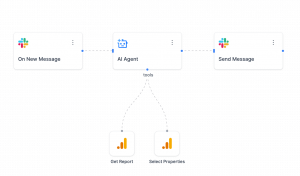Markifact Launches: AI Marketing Automation Platform Disrupting Reporting, Campaign Analysis, and Creative Generation
Markifact introduces an AI platform designed to help teams automate marketing workflows, boost efficiency, and scale campaigns with ease.
Markifact is a platform built to power AI-driven marketing workflows. It enables teams to visually design and automate repetitive marketing tasks through dynamic workflows and custom AI marketing agents. These agents can be configured to handle campaign reporting, performance monitoring, content generation, and cross-platform execution—freeing teams from manual busywork and enabling faster, smarter decisions.
Since its beta release, more than 1,000 agencies and in-house marketing teams have used Markifact to automate tasks such as generating Google Ads slide decks, producing Shopify sales reports, sending Slack-based analytics alerts, creating Meta ad creatives, and conducting SEO research. Early users have reported significant time savings and faster campaign turnaround, establishing Markifact as a standout tool in the AI marketing automation space.
Founded by a team with deep experience in both marketing and technology, Markifact was built to eliminate the manual work that slows modern marketing teams. “Most automation tools are built by engineers who’ve never run a campaign,” said Ahmed Ali, Founder of Markifact. “I’ve built and run campaigns myself—Markifact is the tool I wish I had.”
Markifact is designed for marketing teams managing campaigns across Meta, Google, TikTok, and other platforms. It supports performance marketers looking to accelerate reporting and iteration. Agencies and freelancers can reduce overhead while managing multiple accounts, and founders or growth leaders can scale marketing execution without expanding headcount.
With its official launch, Markifact is redefining how marketing teams operate. The platform combines visual workflow design, ready-to-use templates, seamless integrations, and intelligent AI agents—enabling teams to manage reporting, analysis, and creative tasks in one streamlined solution.
To learn more, visit www.markifact.com.
Ahmed Ali
Markifact
email us here
Visit us on social media:
LinkedIn
Legal Disclaimer:
EIN Presswire provides this news content "as is" without warranty of any kind. We do not accept any responsibility or liability for the accuracy, content, images, videos, licenses, completeness, legality, or reliability of the information contained in this article. If you have any complaints or copyright issues related to this article, kindly contact the author above.
Warehouse Robotics Market to Reach $31,343.7 Million by 2032 at 18.2% CAGR: Allied Market Research
Nano Gold in India Market Growth Analysis Report with Future Business Scope and New Investment Plans by 2027
Packaging and Protective Packaging Market to Reach USD 1.5 Billion by 2031, Expanding at a Steady CAGR of 4.3%
Kalendarium
Więcej ważnych informacji
 Jedynka Newserii
Jedynka Newserii

 Jedynka Newserii
Jedynka Newserii

Prawo

KE proponuje nowy Fundusz Konkurencyjności. Ma pobudzić inwestycje w strategiczne dla Europy technologie
W środę 16 lipca Komisja Europejska przedstawiła projekt budżetu na lata 2028–2034. Jedna z propozycji zakłada utworzenie Europejskiego Funduszu Konkurencyjności o wartości ponad 400 mld euro, który ma pobudzić inwestycje w technologie strategiczne dla jednolitego rynku. Wśród wspieranych obszarów znalazła się obronność i przestrzeń kosmiczna. Na ten cel ma trafić ponad 130 mld euro, pięciokrotnie więcej niż do tej pory.
Firma
Były prezes PGE: OZE potrzebuje wsparcia magazynów energii. To temat traktowany po macoszemu

Choć udział odnawialnych źródeł energii w miksie energetycznym Polski jest stosunkowo wysoki i rośnie, to ten przyrost jest chaotyczny i nierównomiernie rozłożony miedzy technologiami – wskazuje Forum Energii. Dodatkowo OZE potrzebują wsparcia magazynów energii, a zdaniem Wojciecha Dąbrowskiego, prezesa Fundacji SET, ten temat jest traktowany po macoszemu. Brak magazynów powoduje, że produkcja energii z OZE jest tymczasowo wyłączana, co oznacza marnowanie potencjału tych źródeł.
Infrastruktura
Wzrost wynagrodzeń ekip budowlanych najmocniej wpływa na koszty budowy domu. Zainteresowanie inwestorów mimo to nieznacznie wzrasta

Budowa metra kwadratowego domu w Polsce kosztuje od 5,55 do 6 tys. zł w zależności od województwa – wynika z najnowszych analiz firmy Sekocenbud. Najdrożej jest w Warszawie, gdzie cena za metr kwadratowy domu przekroczyła już 6,2 tys. zł. Na przyrosty kosztów budowy domu wpływają zarówno drożejące materiały budowlane, jak i wyższe wynagrodzenia pracowników. Inwestorzy nie rezygnują jednak z budowy domów jednorodzinnych, co ma związek m.in. z wciąż wysokimi cenami mieszkań czy też obniżką stóp procentowych.
Partner serwisu
Szkolenia

Akademia Newserii
Akademia Newserii to projekt, w ramach którego najlepsi polscy dziennikarze biznesowi, giełdowi oraz lifestylowi, a także szkoleniowcy z wieloletnim doświadczeniem dzielą się swoją wiedzą nt. pracy z mediami.










.gif)

 |
| |
| |
|